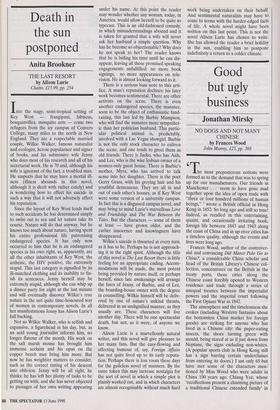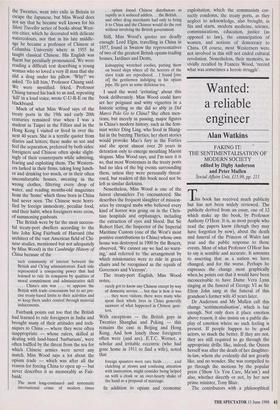Good but ugly business
Jonathan Mirsky
NO DOGS AND NOT MANY CHINESE by Frances Wood John Murray, £25, pp. 368 he most preposterous notions were formed as to the demand that was to spring up for our manufacturers. Our friends in Manchester . . . seem to have gone mad together upon the idea of open trade with "three or four hundred millions of human beings," ' wrote a British official in Hong Kong in 1852. So long ago and still so true! Indeed, as recalled in this entertaining, quaint, and occasionally irritating book, foreign life between 1843 and 1943 along the coast of China and in up-river cities has a timeless quality, although the events and lives were long ago.
Frances Wood, author of the controver- sial and convincing Did Marco Polo Go to China?, a considerable China scholar and head of the British Library's Chinese col- lection, concentrates on the British in the treaty ports, those cities along the Chinese coast forcibly opened to Western residence and trade through a series of unequal treaties between the imperialist powers and the imperial court following the First Opium War in 1842.
The atmosphere and the timelessness she evokes (including Western fantasies about the bottomless China market for foreign goods) are striking for anyone who has lived in a Chinese city: the paper-eating insects, the shoes turning green with mould, being stared at as if just down from Neptune, the signs excluding non-whites. (A popular sports club in Hong Kong still has a sign barring certain underclasses from entering its doors.) I am only 65 but have met some of the characters men: tioned by Miss Wood who were adults in China 100 years ago. Chiang Yee, whose `recollections present a charming picture of a traditional Chinese extended family' in the Twenties, went into exile in Britain to escape the Japanese, but Miss Wood does not say that he became well known for his Silent Traveller series of books about West- ern cities, which he decorated with delicate watercolours, nor that in his late middle- age he became a professor of Chinese at Columbia University where in 1955 he taught classical Chinese. His English was fluent but peculiarly pronounced. We were reading a difficult text describing a young woman who so loved a very ill man that she slid a drug under his pillow. 'Why?' we asked. 'To kill him,' Professor Chiang said. We were mystified. Irked, Professor Chiang turned his back to us and, repeating `kill' in a loud voice, wrote C-U-R-E on the blackboard.
Much of what Miss Wood says of the treaty ports in the 19th and early 20th centuries remained true when I was a student in Taipei in the Fifties and in the Hong Kong I visited or lived in over the next 40 years. She is a terrific quoter from diaries and letters; these make us see and feel the separation, preferred by both sides: foreigners and Chinese often spoke slight- ingly of their counterparts while admiring, fearing and exploiting them. The Western- ers lurked in their firms, taking long lunch- es and drinking too much, or in their often uncomfortable houses, sweating in the wrong clothes, filtering every drop of water, and reading months-old magazines from the 'home' which those born in China had never seen. The Chinese were horri- fied by foreign immodesty, peculiar food, and their habit, when foreigners were cross, of summoning gunboats.
The British were by far the most success- ful treaty-port dwellers according to the late John King Fairbank of Harvard (the architect of the vast American field of Chi- nese studies, mentioned but not adequately by Miss Wood) in the Cambridge History of China because of the
tacit community of interest between the British and Ch'ing administrators. Each side represented a conquering power that had learned to rule its conquests by qualities of moral commitment and administrative skill . . . China's aim was . . to appease the British with trade concessions but to set pre- cise treaty-based limits to their activities and so keep them under control through material inducements.
Fairbank points out too that the British had learned to rule foreigners in India and brought many of their attitudes and tech- niques to China — where they were often inappropriate — whose rulers, skilled at dealing with land-based 'barbarians', were often baffled by the threat from the sea for which Chinese armies were never any match. Miss Wood says a lot about the opium trade — which was after all the reason for forcing China to open up — but never describes it as memorably as Fair- bank:
The most long-continued and systematic international crime of modern times . . . opium found Chinese distributors as rapidly as it seduced addicts. . . the British.. . and other drug merchants had only to bring it to China and the Chinese would do the rest without involving the British government.
Still, Miss Wood's quotes are deadly enough: Lord Elgin, travelling in China in 1857, found in Swatow the representatives of two of the greatest British opium-trading houses, Jardines and Dents,
kidnapping wretched coolies, putting them on board ships where all the horrors of the slave trade are reproduced. . . I found [one of] the gentlemen indulging in his opium pipe. He gave us some delicious tea.
I used the word 'irritating' about this book deliberately. Miss Wood could have set her poignant and witty vignettes in a historic setting as she did so ably in Did Marco Polo Go to China? She often men- tions, but merely in passing, major figures in China's modern history, such as the fem- inist writer Ding Ling, who lived in Shang- hai in the buzzing Thirties; her short stories would provoke Mao's fury in the Forties and she spent almost over 20 years in detention only to emerge mouthing Maoist slogans. Miss Wood says, and I'm sure it is so, that most Westerners in the treaty ports had no idea of the big events surrounding them, unless they were personally threat- ened, but readers of this book need not be left in similar darkness.
Nonetheless, Miss Wood is one of the fairest chroniclers I've encountered. She describes the frequent slaughter of mission- aries by enraged mobs who believed every kind of horror was going on in the Chris- tian hospitals and orphanages, including the extraction of eyes and blood. But Sir Robert Hart, the Inspector of the Imperial Maritime Custom (one of the West's most positive contributions to China) whose own house was destroyed in 1900 by the Boxers, observed, 'We cannot say we had no warn- ing,' and referred to 'the arrangement by which missionaries were to ride in green chairs and be recognised as the equals of Governors and Viceroys'.
The treaty-port English, Miss Wood notes, rarely got to know any Chinese except by way of domestic service. . . but that is how it was . . . they were visitors; there were many who spent their whole lives in China generally unaware of what happened in Chinese quar- ters.
With exceptions — the British gays in Twenties Shanghai and Peking — this remains the case in Beijing and Hong Kong. And how lonely those foreigners often were (and are). E.T.C. Werner, a scholar and irritable eccentric (who had gone home in 1911 to find a wife), noted that
foreign spinsters were rare birds . . . . and clutching at straws and confusing attention with inattention, might consider being helped on with a cloak or an over-hearty shake of the hand as a proposal of marriage.
In addition to opium and economic exploitation, which the communists cor- rectly condemn, the treaty ports, as they neglect to acknowledge, also brought, in fits and starts, modern medicine, science, communications, education, justice (as opposed to law), the emancipation of women, and notions of democracy to China. Of course, most Westerners were not involved in this still not ended cultural revolution. Nonetheless, their memoirs, so vividly recalled by Frances Wood, 'record what was sometimes a heroic struggle'.



































































 Previous page
Previous page